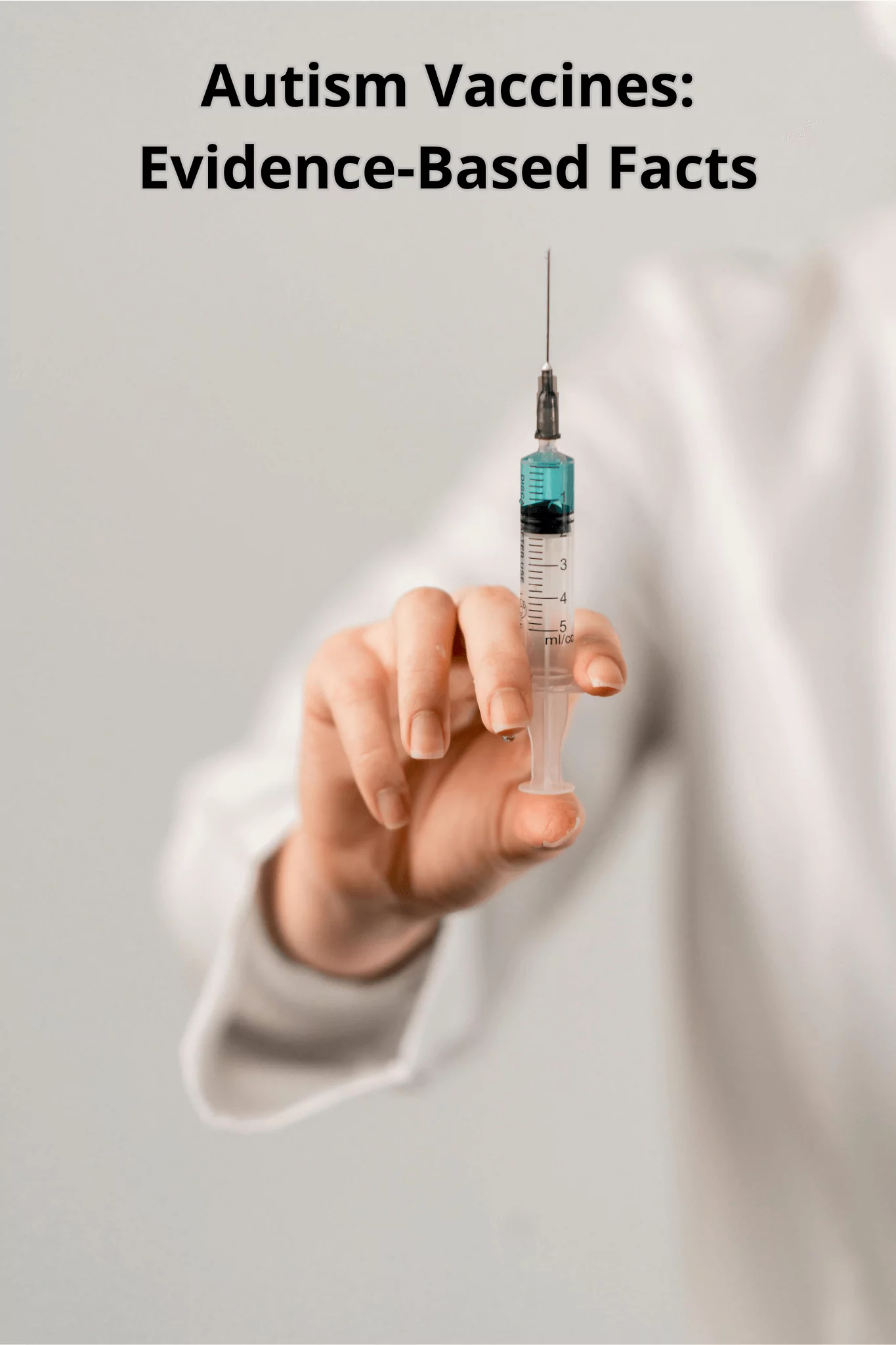With 9 years of experience in the kitchen, I’m passionate about crafting delicious recipes and sharing them with food lovers worldwide. 🍽️✨ Whether it’s a comforting homemade dish or a creative cocktail, my goal is to make cooking fun, easy, and enjoyable for everyone. Join me on this flavorful journey! 🍹🥗

Autism Vaccines: Evidence-Based Facts [2025 Research Update]
Autism Vaccines: Evidence-Based Facts [2024 Research Update]
For years, the topic of vaccines and autism has been shrouded in misinformation and fear. It’s crucial to address these concerns head-on with verifiable scientific evidence and provide clear, accessible information for concerned parents and individuals. This comprehensive guide cuts through the noise, presenting the latest research and expert consensus on the safety and efficacy of vaccines in relation to autism spectrum disorder (ASD).
What is Autism Spectrum Disorder (ASD)?
Autism Spectrum Disorder (ASD) is a complex neurodevelopmental condition characterized by persistent deficits in social communication and social interaction across multiple contexts. These deficits may include difficulties with social reciprocity, nonverbal communicative behaviors used for social interaction, and developing, maintaining, and understanding relationships. ASD also involves restricted, repetitive patterns of behavior, interests, or activities. These symptoms are typically present in early childhood and can significantly impact an individual’s social, occupational, and other important areas of functioning.
It is important to remember that ASD is a spectrum disorder, meaning that the severity and presentation of symptoms can vary widely from person to person. Some individuals with ASD may have significant intellectual disabilities and require substantial support, while others may have average or above-average intelligence and require less assistance. Early diagnosis and intervention are crucial for maximizing an individual’s potential and improving their quality of life. You can learn more about our commitment to early intervention by visiting our About Us page.
Debunking the Myth: The Autism Vaccines Connection
The persistent myth linking vaccines and autism originated from a now-retracted and discredited 1998 study published in The Lancet. This study, conducted by Andrew Wakefield, falsely claimed a connection between the measles, mumps, and rubella (MMR) vaccine and autism. Following extensive investigations, the study was found to be deeply flawed, ethically questionable, and ultimately fraudulent. The Lancet retracted the paper, and Wakefield lost his medical license.
Despite the overwhelming scientific evidence disproving any link, the myth persists due to misinformation, fear-mongering, and a general lack of understanding of scientific research. This has led to vaccine hesitancy, which poses a significant threat to public health. It’s crucial to understand that the scientific community has thoroughly investigated this issue and has consistently found no causal relationship between vaccines and autism. The initial study and its conclusions have been completely invalidated by subsequent, larger, and more rigorous research. It’s a reminder to always critically evaluate sources of information, especially when it comes to health-related topics.
Key Scientific Studies on Autism Vaccines
Numerous large-scale, well-designed studies have investigated the potential link between vaccines and autism and ASD. These studies have consistently found no evidence of a causal relationship. Here are a few examples:
- Meta-analyses: Several meta-analyses, which combine data from multiple studies, have shown no association between vaccines and autism. These analyses provide strong evidence because they pool data from a large number of participants, increasing the statistical power to detect any potential association.
- Epidemiological studies: Large epidemiological studies, such as those conducted in Denmark and the United States, have followed cohorts of vaccinated and unvaccinated children and found no difference in the incidence of autism between the two groups.
- Studies examining specific vaccines: Research has specifically examined the MMR vaccine, thimerosal (a mercury-based preservative formerly used in some vaccines), and other vaccine components and has found no evidence of a link to autism.
These studies have employed rigorous methodologies and have been published in reputable scientific journals. The consensus within the scientific and medical communities is clear: vaccines do not cause autism. You can find information about similar public health initiatives on websites like the World Health Organization.
Understanding Vaccine Safety and Monitoring
Vaccine safety is a top priority for public health organizations and regulatory agencies worldwide. Vaccines undergo extensive testing and monitoring before they are licensed for use. This process includes:
- Pre-clinical testing: Vaccines are first tested in laboratories and on animals to assess their safety and efficacy.
- Clinical trials: Vaccines are then tested in human volunteers in clinical trials, which are conducted in phases to evaluate safety, dosage, and effectiveness.
- Post-licensure monitoring: After a vaccine is licensed, it continues to be monitored for safety through various surveillance systems. These systems track adverse events that occur after vaccination and help to identify any potential safety concerns.
The Centers for Disease Control and Prevention (CDC) and the Food and Drug Administration (FDA) are responsible for monitoring vaccine safety in the United States. These agencies have robust systems in place to detect and investigate any potential safety signals. It’s also important to remember that vaccines, like all medications, can have side effects. However, serious side effects are extremely rare. The benefits of vaccination far outweigh the risks.
Common Childhood Vaccines and Their Role
Childhood vaccines protect against a range of serious and potentially life-threatening diseases. Some of the most common childhood vaccines include:
- MMR vaccine: Protects against measles, mumps, and rubella.
- DTaP vaccine: Protects against diphtheria, tetanus, and pertussis (whooping cough).
- Polio vaccine: Protects against polio.
- Hib vaccine: Protects against Haemophilus influenzae type b.
- Varicella vaccine: Protects against chickenpox.
- Hepatitis B vaccine: Protects against hepatitis B.
These vaccines are recommended by leading medical organizations, such as the American Academy of Pediatrics (AAP) and the CDC, and are considered safe and effective. Vaccination is a cornerstone of preventive healthcare and plays a critical role in protecting children from preventable diseases. Following the recommended vaccination schedule is crucial for ensuring optimal protection.
Addressing Parental Concerns About Autism Vaccines
It’s understandable that parents have concerns about vaccines, especially given the amount of misinformation circulating online. It’s essential to address these concerns with empathy and provide accurate, evidence-based information. Here are some common concerns and how to address them:
- Concern: “I’m worried about the ingredients in vaccines.” Response: Vaccines contain ingredients that help to stimulate the immune system and protect against disease. These ingredients are present in very small amounts and have been extensively studied for safety.
- Concern: “I’ve heard that vaccines can cause autism.” Response: Numerous scientific studies have found no evidence of a link between vaccines and autism. This myth originated from a retracted and discredited study.
- Concern: “I’m worried about my child having a reaction to the vaccine.” Response: Vaccines can cause mild side effects, such as fever or soreness at the injection site. However, serious side effects are extremely rare.
It’s important to have open and honest conversations with your pediatrician about your concerns. They can provide you with accurate information and address any questions you may have. If you need assistance accessing healthcare, feel free to Contact Us.
Expert Opinions on Autism Vaccines
The overwhelming consensus among medical and scientific experts is that vaccines do not cause autism. Leading organizations such as the American Academy of Pediatrics (AAP), the Centers for Disease Control and Prevention (CDC), the World Health Organization (WHO), and the National Academy of Medicine (NAM) have all issued statements affirming the safety and efficacy of vaccines and debunking the myth of a link to autism. These organizations base their recommendations on extensive scientific evidence and rigorous reviews of the available data.
It’s important to rely on credible sources of information and to be wary of misinformation circulating online. Consult with your pediatrician or other healthcare provider if you have any questions or concerns about vaccines. Their expertise and knowledge can help you make informed decisions about your child’s health.
The Importance of Vaccination for Public Health
Vaccination is one of the most effective public health interventions in history. Vaccines have dramatically reduced the incidence of many serious and life-threatening diseases, such as polio, measles, and whooping cough. When a large percentage of the population is vaccinated, it creates herd immunity, which protects those who cannot be vaccinated, such as infants and individuals with weakened immune systems. Vaccine hesitancy, driven by misinformation and fear, can undermine herd immunity and lead to outbreaks of preventable diseases.
It’s crucial to understand that vaccination is not just about protecting yourself or your child; it’s also about protecting the community as a whole. By getting vaccinated, you are contributing to the health and well-being of everyone around you. Vaccination is a shared responsibility that benefits all members of society. If you are interested in supporting these efforts, consider exploring our Services page.
Finding Responsible Information About Autism Vaccines
With so much information available online, it can be difficult to know which sources to trust. When researching vaccines and autism, it’s essential to rely on credible and reputable sources of information. Here are some tips for finding responsible information:
- Consult with your pediatrician or other healthcare provider: They can provide you with accurate information and address any questions or concerns you may have.
- Check the credentials of the source: Look for websites and organizations that are affiliated with reputable medical or scientific institutions.
- Be wary of websites that promote conspiracy theories or unproven claims: Stick to sources that are based on scientific evidence and that are peer-reviewed.
- Look for information that is unbiased and objective: Avoid websites that have a clear agenda or that are trying to sell you something.
Some reliable sources of information about vaccines include the CDC, the WHO, the AAP, and the National Institutes of Health (NIH). These organizations provide evidence-based information that is regularly updated to reflect the latest scientific findings.
Supporting Families Affected by Autism
While it’s crucial to address the misinformation surrounding vaccines and autism, it’s equally important to support families affected by autism. Raising a child with autism can be challenging, and families often need access to a range of resources and support services. These services may include:
- Early intervention programs: These programs provide specialized therapies and support for young children with autism.
- Educational support: Schools can provide accommodations and modifications to help students with autism succeed in the classroom.
- Therapeutic services: Occupational therapy, speech therapy, and behavioral therapy can help individuals with autism develop important skills and improve their quality of life.
- Respite care: Respite care provides temporary relief for parents and caregivers, allowing them to take a break and recharge.
- Support groups: Support groups provide a safe and supportive environment for families to connect with others who understand their experiences.
There are many organizations that provide support and resources for families affected by autism, such as the Autism Society of America and Autism Speaks. By supporting these organizations, you can help to improve the lives of individuals with autism and their families.
Future Research Directions in Autism and Vaccines
While the link between vaccines and autism has been thoroughly debunked, research continues to focus on understanding the causes of autism and developing effective treatments and interventions. Future research directions in autism may include:
- Genetic studies: Identifying genes that contribute to the development of autism.
- Brain imaging studies: Investigating differences in brain structure and function in individuals with autism.
- Environmental studies: Examining environmental factors that may play a role in autism.
- Treatment development: Developing new and more effective therapies and interventions for autism.
By continuing to invest in research, we can improve our understanding of autism and develop better ways to support individuals with ASD and their families. Continued research is key to unlocking more insights and improving lives. You can support this research by donating to reputable organizations.
Conclusion: The Truth About Autism Vaccines
The overwhelming scientific evidence is clear: vaccines and autism are not linked. This myth has been thoroughly debunked by numerous large-scale studies and has been rejected by leading medical and scientific organizations worldwide. It’s crucial to rely on credible sources of information and to be wary of misinformation circulating online. Vaccination is a safe and effective way to protect children from serious and potentially life-threatening diseases. By getting vaccinated, you are not only protecting yourself or your child but also contributing to the health and well-being of the community as a whole.
Let’s focus on supporting families affected by autism and investing in research to improve our understanding of this complex condition. Let’s work together to ensure that all children have the opportunity to thrive and reach their full potential. If you have further questions, please do not hesitate to contact a healthcare professional or consult reputable resources.




